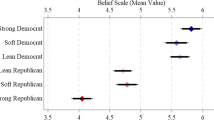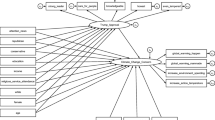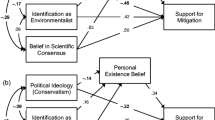Abstract
As scientists warn that climate change threatens to disrupt global agricultural systems, there is a need to better understand how the public thinks about the impacts of climate change on food. Building on prior research demonstrating interactive effects of knowledge (e.g., issue understanding and educational attainment) and political party identification in public concern about climate change, we analyze data from 816 respondents drawn from a national probability survey of U.S. adults (fielded September 4–December 10, 2018) to examine whether these factors would similarly predict concern about climate change impacts on food choice, specifically. Indeed, we find that knowledge variables more strongly predict concern among Democrats than Republicans. These general patterns persist in models featuring political ideology (liberalism-conservatism) instead of party identification, and when we control for belief in climate change and other demographic variables (age, gender). Results shed light on the dynamics underlying public concern about projected consequences of anthropogenic climate change that carry widespread implications for food security, public health, and nutrition around the globe.

Similar content being viewed by others
Notes
The key outcome variable in these surveys read, “Do you think that global warming will pose a serious threat to you or your way of life in your lifetime, or not?” and the subjective knowledge item read, “Next, thinking about the issue of global warming, sometimes called the ‘greenhouse effect,’ how well do you feel you understand this issue—would you say very well, fairly well, not very well, or not at all?”.
References
American Association for Public Opinion Research (AAPOR). 2019. Margin of sampling error/credibility interval. https://www.aapor.org/AAPOR_Main/media/MainSiteFiles/Margin-of-Sampling-Error_1.pdf. Accessed 1 Oct 2019.
Bail, C.A., L.P. Argyle, T.W. Brown, J.P. Bumpus, H. Chen, M.B.F. Hunzaker, J. Lee, M. Mann, F. Merhout, and A. Volfovsky. 2018. Exposure to opposing views on social media can increase political polarization. Proceedings of the National Academy of Sciences 115 (37): 9216–9221.
Block, L.G., S.A. Grier, T.L. Childers, B. Davis, J.E.J. Ebert, S. Kumanyika, R.N. Laczniak, J.E. Machin, C.M. Motley, L. Peracchio, S. Pettigrew, M. Scott, and M.N.G.G. Bieshaar. 2011. From nutrients to nurturance: A conceptual introduction to food well-being. Journal of Public Policy & Marketing 30 (1): 5–13.
Bolin, J., and L. Hamilton. 2018. The news you choose: News media preferences amplify views on climate change. Environmental Politics 27 (3): 455–476.
Brügger, A., S. Dessai, P. Devine-Wright, T.A. Morton, and N.F. Pidgeon. 2015. Psychological responses to the proximity of climate change. Nature Climate Change 5 (12): 1031–1037.
Cairns, K., and J. Johnston. 2018. On (not) knowing where your food comes from: Meat, mothering and ethical eating. Agriculture and Human Values 35 (3): 569–580.
Chong, D., and J.N. Druckman. 2007. Framing theory. Annual Review of Political Science 10: 103–126.
Davidson, A.R., and J.J. Jaccard. 1979. Variables that moderate the attitude–behavior relation: Results of a longitudinal survey. Journal of Personality and Social Psychology 37 (8): 1364–1376.
Douglas, M. 2014. Food in the social order. New York: Routledge.
Druckman, J.N., and M.C. McGrath. 2019. The evidence for motivated reasoning in climate change preference formation. Nature Climate Change 9 (2): 111–119.
Dunlap, R.E., A.M. Mccright, and J.H. Yarosh. 2016. The political divide on climate change: Partisan polarization widens in the US. Environment: Science and Policy for Sustainable Development 58 (5): 4–23.
Feldman, L. 2016. Effects of TV and cable news viewing on climate change opinion, knowledge, and behavior. In Oxford encyclopedia of climate change communication, ed. M. Nisbet. New York: Oxford University Press.
Frohlich, X. 2017. The informational turn in food politics: The US FDA’s nutrition label as information infrastructure. Social Studies of Science 47 (2): 145–171.
Funk, C., and B. Kennedy. 2016. The politics of climate. Pew Research Center. https://climateaccess.org/sites/default/files/Pew_Politics%20of%20Climate.pdf. Accessed 22 April 2019.
Gay, C., F. Estrada, C. Conde, H. Eakin, and L. Villers. 2006. Potential impacts of climate change on agriculture: A case of study of coffee production in Veracruz Mexico. Climatic Change 79 (3–4): 259–288.
Gifford, R., and R. Sussman. 2012. Environmental attitudes. In Oxford handbook of environmental and conservation psychology, ed. S.D. Clayton, 65–80. New York: Oxford University Press.
Gross, M. 2014. Coffee and chocolate in danger. Current Biology 24 (11): R503–506.
Haaland, R. 2007. Porridge and pot, bread and oven: Food ways and symbolism in Africa and the Near East from the Neolithic to the present. Cambridge Archaeological Journal 17 (2): 165–182.
Hamilton, L. 2011. Education, politics and opinions about climate change: Evidence for interaction effects. Climatic Change 104 (2): 231–242.
Hamilton, L. 2018. Self-assessed understanding of climate change. Climatic Change 151 (2): 349–362.
Hannah, L., P.R. Roehrdanz, M. Ikegami, A.V. Shepard, M.R. Shaw, G. Tabor, L. Zhi, P.A. Marquet, and R.J. Hijmans. 2013. Climate change, wine, and conservation. Proceedings of the National Academy of Sciences 110 (17): 6907–6912.
Heberlein, T.A., and J.S. Black. 1976. Attitudinal specificity and the prediction of behavior in a field setting. Journal of Personality and Social Psychology 33 (4): 474–479.
Hestres, L.E. 2014. Preaching to the choir: Internet-mediated advocacy, issue public mobilization, and climate change. New Media & Society 16 (2): 323–339.
Hoek, A.C., D. Pearson, S.W. James, M.A. Lawrence, S. Friel, and S. 2017. Shrinking the food-print: A qualitative study into consumer perceptions, experiences and attitudes towards healthy and environmentally friendly food behaviours. Appetite 108: 117–131.
IPCC. 2018. Summary for policymakers. In Global warming of 1.5°C. An IPCC Special Report on the impacts of global warming of 1.5°C above pre-industrial levels and related global greenhouse gas emission pathways, in the context of strengthening the global response to the threat of climate change, sustainable development, and efforts to eradicate poverty, ed. V. Masson-Delmotte, P. Zhai, H.-O. Pörtner, D. Roberts, J. Skea, P.R. Shukla, A. Pirani, W. Moufouma-Okia, C. Péan, R. Pidcock, S. Connors, J.B.R. Matthews, Y. Chen, X. Zhou, M.I. Gomis, E. Lonnoy, T. Maycock, M. Tignor, and T. Waterfield. Geneva: IPCC.
Kunda, Z. 1990. The case for motivated reasoning. Psychological Bulletin 108 (3): 480–498.
Loureiro, M.L., and J. Lotade. 2005. Do fair trade and eco-labels in coffee wake up the consumer conscience? Ecological Economics 53 (1): 129–138.
Maibach, E.W., N. Nisbet, P. Baldwin, K. Akerlof, and G. Diao. 2010. Reframing climate change as a public health issue: An exploratory study of public reactions. BMC Public Health 10 (1): 299–309.
Malka, A., J.A. Krosnick, and G. Langer. 2009. The association of knowledge with concern about global warming: Trusted information sources shape public thinking. Risk Analysis 29 (5): 633–647.
McCright, A.M., and R.E. Dunlap. 2011. The politicization of climate change and polarization in the American public's views of global warming, 2001–2010. The Sociological Quarterly 52 (2): 155–194.
Müller, C., W. Cramer, W.L. Hare, and H. Lotze-Campen. 2011. Climate change risks for African agriculture. Proceedings of the National Academy of Sciences 108 (11): 4313–4315.
Newman, T.P., E.C. Nisbet, and M.C. Nisbet. 2018. Climate change, cultural cognition, and media effects: Worldviews drive news selectivity, biased processing, and polarized attitudes. Public Understanding of Science 27 (8): 985–1002.
Nisbet, M.C. 2009. Communicating climate change: Why frames matter for public engagement. Environment: Science and Policy for Sustainable Development 51 (2): 12–23.
Prentice, C. 2018. Americans are drinking a daily cup of coffee at the highest level in six years: Survey. Reuters, March 17. https://www.reuters.com/article/us-coffee-conference-survey/americans-are-drinking-a-daily-cup-of-coffee-at-the-highest-level-in-six-years-survey-idUSKCN1GT0KU. Accessed 16 Sept 2019.
Roff, R.J. 2007. Shopping for change? Neoliberalizing activism and the limits to eating non-GMO. Agriculture and Human Values 24 (4): 511–522.
Schmidhuber, J., and F.N. Tubiello. 2007. Global food security under climate change. Proceedings of the National Academy of Sciences 104 (50): 19703–19708.
Schuldt, J.P., and N. Schwarz. 2010. The “organic” path to obesity? Organic claims influence calorie judgments and exercise recommendations. Judgment and Decision Making 5 (3): 144–150.
Schuldt, J.P., P.K. Enns, and V. Cavaliere. 2017. Does the label really matter? Evidence that the US public continues to doubt “global warming” more than “climate change”. Climatic Change 143 (1–2): 271–280.
Schwarz, N. 2014. Cognition and communication: Judgmental biases, research methods, and the logic of conversation. London: Psychology Press.
Simmons, D. 2019. A brief guide to the impacts of climate change on food production. Yale Climate Connections, September 18. https://www.yaleclimateconnections.org/2019/09/a-brief-guide-to-the-impacts-of-climate-change-on-food-production/. Accessed 1 Oct 2019.
Sörqvist, P., A. Haga, L. Langeborg, M. Holmgren, M. Wallinder, A. Nöstl, P.B. Seager, and J.E. Marsh. 2015. The green halo: Mechanisms and limits of the eco-label effect. Food Quality and Preference 43: 1–9.
Sturgis, P., and N. Allum. 2004. Science in society: Re-evaluating the deficit model of public attitudes. Public Understanding of Science 13 (1): 55–74.
van der Linden, S., A.A. Leiserowitz, and E.W. Maibach. 2019. The gateway belief model: A large-scale replication. Journal of Environmental Psychology 62: 49–58.
Vermeulen, S.J., B.M. Campbell, and J.S. Ingram. 2012. Climate change and food systems. Annual Review of Environment and Resources 37: 195–222.
Wallendorf, M., and E.J. Arnould. 1991. “We gather together”: Consumption rituals of thanksgiving day. Journal of Consumer Research 18 (1): 13–31.
Wänke, M. 2007. What is said and what is meant: Conversational implicatures in natural conversations, research settings, media and advertising. In Social Communication, ed. K. Fiedler, 223–256. London: Psychology Press.
Washburn, A.N., and L.J. Skitka. 2018. Science denial across the political divide: Liberals and conservatives are similarly motivated to deny attitude-inconsistent science. Social Psychological and Personality Science 9 (8): 972–980.
Xie, W., W. Xiong, J. Pan, T. Ali, Q. Cui, D. Guan, J. Meng, N.D. Mueller, E. Lin, and S.J. Davis. 2018. Decreases in global beer supply due to extreme drought and heat. Nature Plants 4 (11): 964–973.
Yeo, S.K., M.A. Xenos, D. Brossard, and D.A. Scheufele. 2015. Selecting our own science: How communication contexts and individual traits shape information seeking. The Annals of the American Academy of Political and Social Science 658 (1): 172–191.
Author information
Authors and Affiliations
Corresponding author
Additional information
Publisher's Note
Springer Nature remains neutral with regard to jurisdictional claims in published maps and institutional affiliations.
Rights and permissions
About this article
Cite this article
Schuldt, J.P., Eiseman, D.L. & Hoffmann, M.P. Public concern about climate change impacts on food choices: The interplay of knowledge and politics. Agric Hum Values 37, 885–893 (2020). https://doi.org/10.1007/s10460-020-10019-7
Accepted:
Published:
Issue Date:
DOI: https://doi.org/10.1007/s10460-020-10019-7




